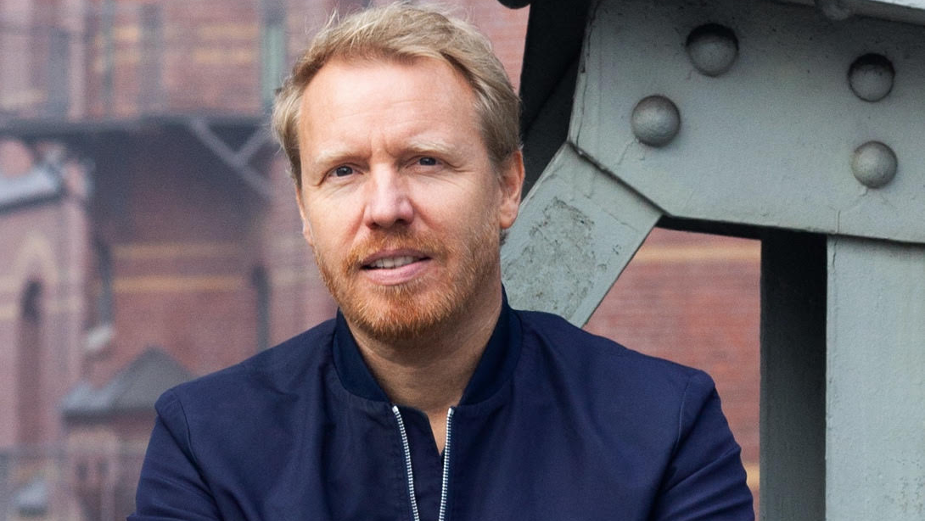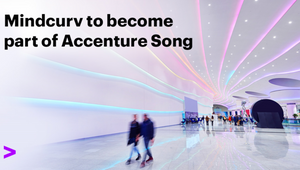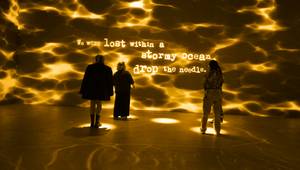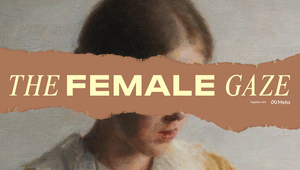
5 Minutes with… Fabian Frese

Fabian Frese admits that for a long time he was a traditional advertising creative, a natural copywriter with a rich understanding of TVCs, print ads and billboards. But up until 2013 his knowledge of all things digital was lacking. By that point he was already a big name in German advertising as ECD of Jung von Matt, at a time when it was recognised as Germany's Agency of the Year and Independent Agency of the Year at Cannes Lions.
He didn’t want to rest on his laurels though, so dropped everything to embark on a ‘digital sabbatical’, founding a start-up and touring as an intern through various digital companies, facing his ignorance head on.
In 2014, he returned to advertising at Kolle Rebbe in Hamburg, becoming creative managing director and partner where he’s worked for clients including Netflix and the global Lufthansa account to produce work that ties all of his traditional experience together with his newfound digital smarts.
LBB> Where did you grow up and what sort of kid were you? Were there any clues about your creative future?
Fabian> I grew up in Aachen, which is a city in the very west of Germany, right next to the Dutch and Belgian border. My father was a professor at a university and my mum took care of me and my brother.
I was always a very creative kid. I remember when I was eight I won the painting competition with the local newspaper. That was the spark that taught me this could be my line of business... Well, no, not really! But my mum still has that picture hanging and sometimes I still look at it and think it’s really good! I deserved to win!
LBB> What was the painting of?
Fabian> I think the competition was to draw something about Easter. My drawing was like a chicken factory where they’re laying all the Easter eggs, kind of Orson Welles style.
LBB> So if you were a creative kid, why did you decide to train in law?
Fabian> It’s a little bit strange. I always wanted to become a journalist. I always loved writing. I started to write for some newspapers when I was in school. I liked that people read what I wrote.
I asked a friend of my parents, who was quite a well-known journalist in Germany what I should do to become one. He said I should not study the typical subjects like languages. I should study economics, law or medicine. My father was doing economics so I thought I should do something else. And I’m not so good with numbers. So, I thought why not study law? I never wanted to be a lawyer. I just needed to study this to become a journalist. Which is insane because it’s one of the toughest things you can study.
It was tough, but I don’t regret that I’ve done it. You might think that law is the opposite of being creative, but it really helped me later in my job because you learn to think very logically and precisely and to go deep into facts. That has often helped me with what I’m doing now. Although it took a while to get rid of the really unemotional and technical language when I started in advertising.
If I get a five-page client brief and you go through it, I still read it like a law case. I go through it and very quickly find the important pieces, then combine them together. Like the Mr Spock of advertising.
LBB> How did that background lead you to advertising then?
Fabian> When I left university I started at a TV channel. Which was a wrong decision. I always wanted to write and go to a newspaper and this was nothing to do with writing. It was a crappy, tabloid show I was working for. So for a year it was really depressing. All my journalism plans hadn’t seemed to work.
A friend of mine came to me. She was working at BBDO. She said I should come over and meet some people and maybe get an internship because I could write and had good ideas. I’d never cared about advertising.
I had this interview. They asked me what I’d done in advertising before. I said “nothing”. I’d studied law. But then there was a party at the agency. I knew some people there who took me. We were drinking until five in the morning and the next day I had a job. That was how I entered advertising!
LBB> Early in your career, what were the formative projects or moments for you?
Fabian> I knew nothing about it. I will never forget my first film shoot. It was for Whiskas cat food. I’d been at BBDO for six months maybe. The script was about a cat moving to a new house; she feels bad about it and then she gets her food and is happy again. One of these scripts that’s researched and researched 50 times and then they decide to do it. I came to this film set and there was a cat trainer, three guys hanging around decorating cat food, five people holding a lamp and a director stuffed with cocaine talking to the cat. I thought this business could be really fun.
I will also never forget the moment when I left BBDO and moved to Hamburg to Jung von Matt. As a creative in Germany if you want to do the really cool stuff you have to go to Hamburg. At BBDO I was a creative shooting star and they liked all my ideas, celebrated me, I won awards. Then I moved to Hamburg and my first meeting was for Mini. I came into this meeting with three or four film scripts and there were five or six other creatives in the room with piles of paper - 30 or 40 film scripts that they’d produced in one or two days. I thought “shit, what’s going on here?” They presented their scripts and they were all great. I was shaking. Then I realised this is a totally different planet to what I’d experienced so far. Creativity is really hard work. That a moment I quite often think back to. It really had an impact on me.
LBB> Is there any advice you wish you'd received earlier in your career?
Fabian> If it doesn’t make you happy don’t do it. That’s something I tell young creatives. It comes from my father because when he was a professor, he was happy that I studied law. I was a bit afraid to tell him I’d never be a lawyer and was going into advertising. But he told me I had to do what I really like and that you’ll never be good at something you don’t like. That’s very important advice. Thank God I got it early on. The older you get the more you think you should have done more of what makes you happy.
LBB> Tell me about your 'digital sabbatical'. Why did you decide you needed that after years in advertising?
Fabian> One reason was that at the time I’d been ECD at Jung von Matt for a few years. I was bored. I’d done campaign after campaign and got more into management and less being creative myself. I’d been in the rat race for years. It wasn’t burnout but I had to change something.
The other reason was because of the management side, I had no time to engage with all the changes our business had been through. I come from this TV commercial, radio ad, double print page time. And suddenly digital ways of working were coming closer and closer and I didn’t have time to prepare for it. There were young creatives coming and showing me ideas and I didn’t know what they were telling me. I had to say “if you think it’s good then do it”. Clients became smarter. They knew more about social media and tech than I did, which didn’t feel very good.
I had to change something. It was a tough decision because being ECD at Jung von Matt was the best job you could have as a creative in Germany at the time. We’d just won Independent Agency of the Year in Cannes. We were top of everything. But it just didn’t feel good to me anymore.
I went to Jean-Remy von Matt, the founder of Jung von Matt and said “I’m sorry. I have to leave.” He said OK. He understood me because he was excited by the change that had happened but also had no time to take care of it. He said “It’s sad that you’re leaving, but the day you’re back here in the morning, you’re working here again.” That made the decision a bit easier for me. But I stepped out.
LBB> And how did you spend that time?
Fabian> I did a lot of different things. I did internships. My first four weeks were spent at a social media agency. I wanted to learn how they work. I wanted as many people as possible around me to teach me what I didn’t know.
I spent time at Google, where people taught me all they knew. And I founded my own start-up with some friends.
I had an office with a guy who was brutally digital. He did ecommerce - stuff that I would never have cared about - but I forced myself to sit next to him and see what he was doing.
This was probably the best time I’d ever had. I met new people every day and I learned something new every day. Before that it’s very comfortable to do things you’ve done over and over. You have a routine and nothing can scare you. But the real fun is to do things you’ve never done before. It was an amazing time for me.
LBB> What lessons did you take from that time?
Fabian> The most important lesson was the power of digital. When you come from the TV commercial world, you’re always a bit distant from digital, maybe a bit scared - you think you’re doing the real business and they [the digital people] are just disturbing you. But I realised how much better communication can be if you combine these worlds. All these skills and crafts I had, with the digital world.
For example, I got a call from R/GA at that time. It had turned at the time from a very tech-driven agency to a communications agency doing more advertising. These two worlds collided when I went there. They did all the stuff I wanted to learn but didn’t know about and I had all the skills they needed to make fully integrated campaigns. This is how I realised what a difference digital can make if you combine it with the stuff I’d already done.
LBB> What was the experience of returning to advertising at Kolle Rebbe like?
Fabian> I really liked the freedom that I had and I really could have spent the next 50 years meeting people and doing things that I can’t, but that would have been a tough decision, financially. I was happy but I chose quite carefully which agency I went back to. I thought about opening my own company but I’m not that company founder. I like to get into an existing system where I can change things but I don’t have to Google where I get printers for example.
I chose Kolle Rebbe because it was the best mixture of the things I’ve done in my life. On the one hand they do classical advertising but on the other hand they develop their own products, they have a fantastic design lab, or they engage with startups. All the pieces came together in this one place.
Besides that I was always a big fan of the special culture they have.
So the re-entry was quite easy for me because I found all the things I’d experienced in the previous years in one place.
LBB> Accenture Interactive in Germany seems to be a well-oiled machine. It’s a good group of businesses.
Fabian> I think Germany is the prototype of the whole region that’s behind it. We have one great company for each capability. The tech consulting part, then we have SinnerSchrader, which was always the best digital agency in Germany, Kolle Rebbe with its whole campaign and communications expertise, Fjord, Mackevision. This whole wheel is coming together in combination. That’s why we joined Accenture Interactive and not WPP or Omnicom. The idea behind it is the way we felt it should be and the way communication goes. In Germany it’s quite special. We have all these capabilities here.
LBB> What work are you most proud of in recent years and why?
Fabian> I think what I’m most proud of is the way we changed the communication for Lufthansa. Our biggest client. In the last six years we’ve managed to go into a totally new direction. It used to be a typical TV commercials and print clients, like everybody was. But we managed to be so content focused and smart, we orchestrated campaigning. In Germany it’s really outstanding. They’re an amazing client.
LBB> We're living through interesting times. What interests you most about the way advertising is responding to it all?
Fabian> What’s really interesting is all the purpose. It’s the biggest buzzword in the past two years probably. But it’s interesting how people expect brands to take social responsibility. The interesting thing about Covid-19 is that before it every brand wanted to have a purpose and do something, but most of the time it never felt real. It’s like their marketing agency said, “hey, you need a purpose. We’re going to find one for you.” But in Covid there are many great examples of how brands took over social responsibility. This is making this purpose thing even more dynamic. In the end if I work for Lufthansa or other clients, I don’t feel like they’re my client. I feel like I’m an employee of them. I work for them. And I’m proud of my employer who takes social responsibility. I feel that it makes my job more valuable. It’s more satisfying to work for a brand that’s not only selling stuff (which is of course the main purpose) but also being aware of how to treat the world.
This is more interesting for me than all the digital developments, which are also cool. Every touchpoint is now a brand moment. But the purpose thing is a fantastic development.
LBB> I heard you're a drummer, do you still play a lot of music?
Fabian> I have a drum kit at home still, but to be honest I never play on it. Sometimes I try to teach my son. He’s nine years old. But he’s not really into it. But when he realises that girls like drummers, I hope he might change his mind.













